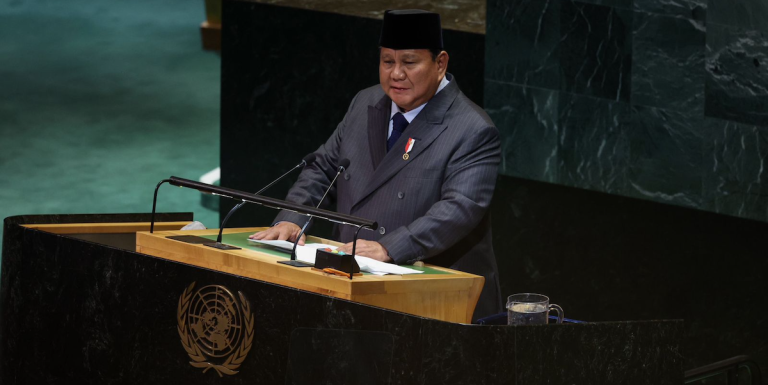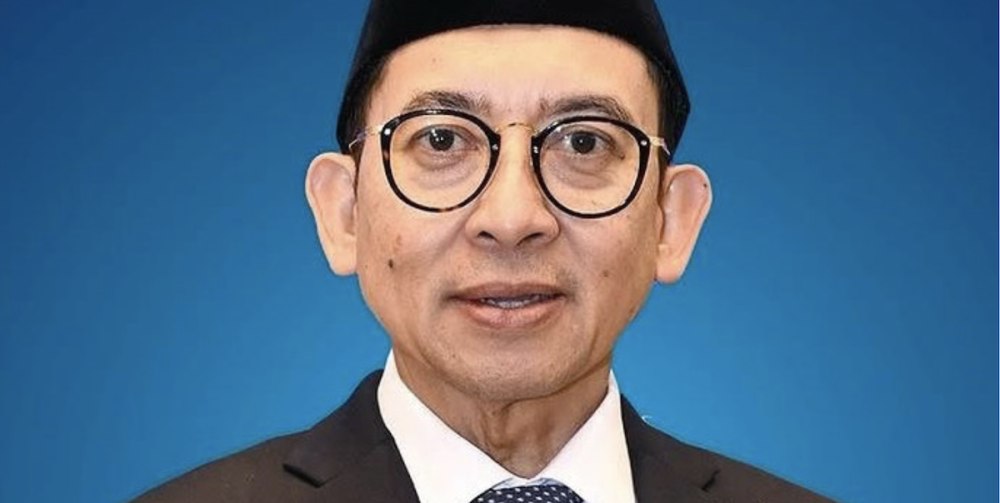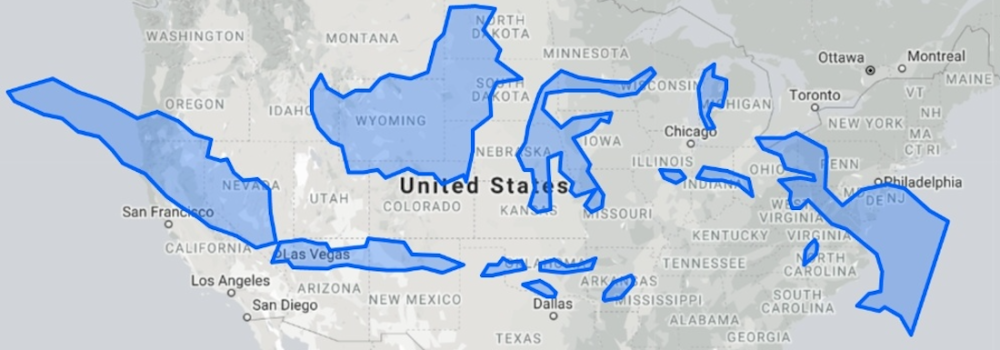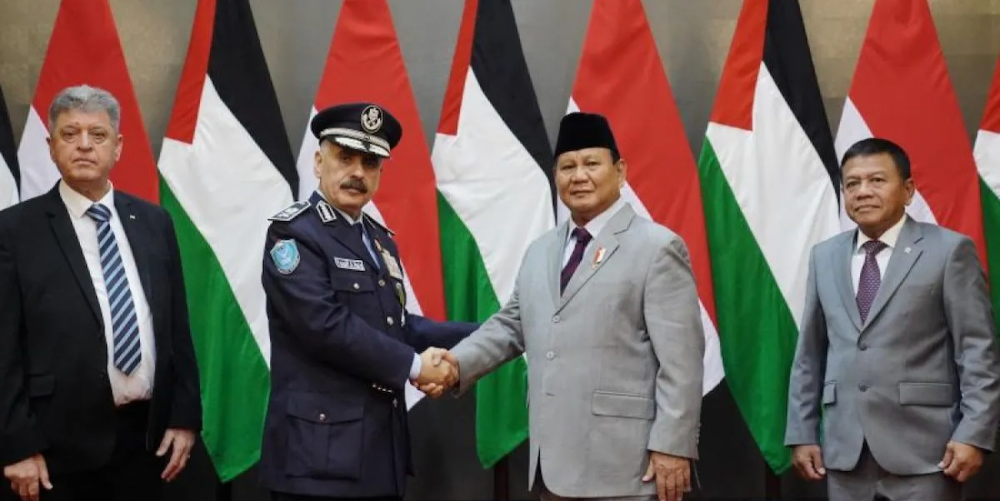
In a historic return to the U.N. General Assembly podium, President Prabowo Subianto channels a legacy of nonalignment to advocate for Palestine and a new multilateral order

New York, N.Y. – A world grappling with resurgent conflicts, economic uncertainty, and a crisis of trust in international institutions received a potent reminder of a different path this week. From the iconic green marble podium of the United Nations General Assembly, Indonesia’s newly elected leader, President Prabowo Subianto delivered a speech that was as much a reintroduction of his nation to the world stage as it was a clarion call for a more just and inclusive global order.
For the first time in a decade, an Indonesian president addressed the assembly, signaling a strategic and philosophical re-engagement with multilateralism at a time when it is under significant strain.
The address, positioned between speeches from the populist firebrandism of U.S. President Donald Trump [Luce Index™ score: 35/100] and the leftist pragmatism of Brazilian President Luiz Inácio Lula da Silva [Luce Index™ score: 81/100], carved out a distinct space for Indonesia—the world’s third-largest democracy and a rising economic power.
It was a performance steeped in historical resonance, deliberately echoing the revolutionary spirit of Indonesia’s founding father, President Sukarno [Luce Index™ score: 87/100], who in 1960 commanded the same stage with his landmark address, “To Build the World Anew.”
A Legacy of “Bebas-Aktif” on the World Stage
The philosophical bedrock of Indonesia’s foreign policy for decades has been the principle of bebas-aktif, or “independent and active.” This doctrine of nonalignment insists that the nation not entangle itself in the military pacts and power blocs of major global powers, instead pursuing its own interests through assertive diplomacy and bridge-building. In a contemporary context defined by the escalating rivalry between the U.S. and China, Indonesia’s stance is not one of passive neutrality but of active, principled independence.

In a viewpoint piece for The Jakarta Post published ahead of the address, Fadli Zon, the nation’s Minister of Culture, framed this return as a necessity.
“Today’s global landscape is more complex than ever, characterized by turbulent challenges and unpredictable storms that no nation can face alone,” Zon wrote.

He pointedly critiqued the “persistence of unilateralism,” where countries act on “narrow self-interest without regard for international law,” as a fundamental threat to global stability.
President Prabowo’s speech was the practical embodiment of this critique.
He articulated a vision for a world where the “dynamic rise of emerging economic powers” fosters a “more diverse and interconnected global landscape,” one where no single nation stands above another.
This vision directly challenges the remnants of the post-Cold War unipolar moment and advocates for a multipolar world where leadership is collective and diverse.
The Centrality of Palestine and a Stance Against “Double Standards”
No issue more powerfully illustrated Indonesia’s commitment to this principled stance than its unequivocal position on Palestine. President Prabowo left no room for ambiguity, condemning the “double standards in international politics” that have, in Jakarta’s view, allowed the plight of the Palestinian people to persist.
He rooted this position in Indonesia’s own national identity, recalling the opening lines of its 1945 Constitution, which states that “independence is the inalienable right of all nations, and that colonialism must be abolished.”
Minister Zon’s article provided a poignant cultural framing to this political stance, lamenting
that Palestinians have “not only been targeted by military occupation and genocide for more than
seven decades, but by a systemic destruction of civilization: its history, memory, and heritage.”
This elevates the conflict from a purely territorial dispute to an assault on a people’s very existence.

Beyond rhetoric, Indonesia sought to demonstrate its commitment through tangible action.
President Prabowo announced the nation’s readiness to contribute over 20,000 personnel to a potential U.N.-mandated peacekeeping force in Gaza.
This is a substantial pledge, underscoring a willingness to back diplomacy with boots on the ground.
Furthermore, he highlighted ongoing humanitarian missions, such as the Garuda Merah Putih-II, and scholarship programs for Palestinian students, presenting a holistic approach to supporting what he reiterated is the only viable solution: a two-state solution.
The Imperative for U.N. Reform and Inclusive Governance
A recurring theme throughout the Indonesian delegation’s diplomatic push was the urgent need for reform of the United Nations itself, particularly its powerful Security Council. The current structure, a relic of the immediate post-World War II order, is widely seen as unrepresentative of 21st-century geopolitical realities. The veto power held by the five permanent members—the U.S., Russia, China, France, and the U.K.—has often paralyzed the body, especially on issues related to the Middle East.

President Prabowo argued that for the U.N. to retain its legitimacy and effectiveness, it must become more efficient, transparent, and inclusive. “These realities highlight the urgent need for U.N. reforms,” Minister Zon concurred in his writing, “particularly through restructuring the Security Council to reflect today’s geopolitical realities.”
This call for reform is a central plank of Indonesia’s, and many other emerging powers’, vision for a renewed multilateralism that can effectively manage global challenges from climate change to pandemic response.
This push for a more balanced global governance structure was framed not as a rejection of the West but as a call for all great civilizations to step up. President Prabowo explicitly invoked the “world’s great civilizations – the Western, Eastern, American, European, Indian, Persian, Chinese, and Islamic” to rise to their “historic responsibilities with statesmanship marked by wisdom, restraint, and humility.”

A Vision of Unity in Diversity for a Complex Future
Underpinning the political and diplomatic arguments was a profound philosophical message about unity in diversity. As a vast archipelago of over 17,000 islands, hundreds of ethnic groups, and multiple major religions, Indonesia itself is a microcosm of the world’s complexities.

President Prabowo’s assertion at the U.N.G.A. that “despite our diverse backgrounds, we are united as one human family” was not merely aspirational but drawn from the national motto, Bhinneka Tunggal Ika (“Unity in Diversity”).
Minister Zon elaborated on this, noting that “peace and diversity are deeply interconnected.”
While acknowledging that diversity can be a source of friction, he argued it is ultimately “a powerful force that unites nations in building just, inclusive, and harmonious societies.”
This perspective offers an antidote to the rising polarization and nationalist isolationism witnessed in many parts of the globe.
As the world looks toward 2030 and the looming deadlines for the U.N.’s Sustainable Development Goals, the challenges are undeniably vast and interconnected.
Indonesia, through its return to the center stage of global diplomacy, has positioned itself not as a mere participant but as a proactive architect of the international system.
By championing a foreign policy grounded in its own hard-won independence, advocating relentlessly for the disenfranchised, and calling for institutional reform, it offers a vision of global stewardship rooted in cooperation, shared responsibility, and a fundamental respect for the equal dignity of all nations and peoples. The world, fractured and in search of direction, appears ready to listen.

Indonesia Reclaims Its Global Voice at a Fractured United Nations (Sept. 24, 2025)
Summary
In a historic address at the U.N. General Assembly, Indonesia’s President Prabowo Subianto marked his nation’s return to the global stage after a decade-long absence. Channeling the spirit of founding father Soekarno, he championed a foreign policy of nonalignment and multilateral cooperation. The speech was a forceful condemnation of unilateralism and double standards, with a central focus on advocating for Palestinian statehood and offering Indonesian peacekeepers. The address also served as a call for urgent reform of the U.N. Security Council to better reflect modern geopolitical realities, positioning Indonesia as a key voice for a more just and inclusive world order.
#IndonesiaUNGA #PrabowoSubianto #Multilateralism #UNReform
#Palestine #Nonalignment #GlobalLeadership #ForeignPolicy #Gaza
TAGS: Indonesia, Prabowo Subianto, United Nations General Assembly, UNGA, Foreign Policy, Multilateralism, Geopolitics
Nonalignment, Palestine, Gaza, Two-State Solution, UN Reform, Security Council, Soekarno, Fadli Zon, Global Governance
